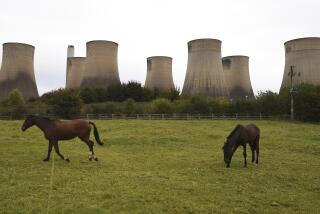U.K. government recalls Parliament for emergency legislation to save British Steel

- Share via
LONDON — The U.K. government on Friday called an emergency weekend Parliament session to pass legislation aimed at saving the country’s last factory that makes steel directly from raw materials, a move widely called for since U.S. President Trump imposed tariffs on imported steel.
British Prime Minister Keir Starmer said lawmakers are being asked to return on Saturday from their Easter break to back legislation that will see British Steel and its plant in the north of England town of Scunthorpe come under government control from its Chinese owner Jingye Group.
If the bill passes, which is expected, the government will have the power to direct the company’s board and workforce, ensure workers get paid and order the raw materials necessary to keep the plant’s blast furnaces running.
“This afternoon, the future of British Steel hangs in the balance,” Starmer said. “Jobs, investment, growth, our economic and national security are all on the line.”
Though he did not use the term “nationalization,” he did say all options remain on the table.
Whatever the long-term plan, it’s clear that time is running out for the steel works, which employs around 2,700 workers directly.
Jingye has canceled orders for the iron pellets used in the plant’s two massive blast furnaces. Without the pellets and other raw materials, the blast furnaces would have to shut for good.
It’s unclear what role Jingye, owner of British Steel since 2020, will have in the day-to-day running of the steel works.
Jingye, which has said the Scunthorpe plant is financially unsustainable due to “challenging market conditions,” tariffs and increased environmental costs, has for months sought a government rescue but discussions have failed to reach a successful outcome.
Trump’s decision last month to slap a 25% tariff on all imported steel and aluminum weighed further on the prospects of British Steel. Though Starmer has expressed disappointment at the tariffs imposed, he has not retaliated and is seeking to negotiate the tariffs away.
Unions have welcomed his initiative to call back Parliament and voiced hope that it will eventually lead to the government taking ownership of the plant.
“It is in the national interest that a solution is found to secure a future for British Steel as a vital strategic business,” said Roy Rickhuss, general secretary of the union Community. “We can’t allow Britain to become the only G-7 country without primary steelmaking capacity.”
At its height in the postwar period, British steelmaking was a global leader, employing more than 300,000 people, before cheaper offerings from China and other countries hit production. It now employs about 40,000 directly, with the industry accounting for just 0.1% of the British economy.
Britain’s remaining steelmakers are under pressure to reduce carbon emissions amid the threat of global warming. Most have shifted to electric arc furnaces that make steel from recycled material. That has left Scunthorpe as the only factory with blast furnaces capable of turning iron ore into virgin steel.
The steel industry, Starmer said, is “part of our national story.”
This is the first time lawmakers have been called back from their recess to sit on a Saturday since 1982 in the aftermath of Argentina’s invasion of the British-run Falkland Islands in the south Atlantic.
Pylas writes for the Associated Press.
More to Read
Sign up for Essential California
The most important California stories and recommendations in your inbox every morning.
You may occasionally receive promotional content from the Los Angeles Times.








